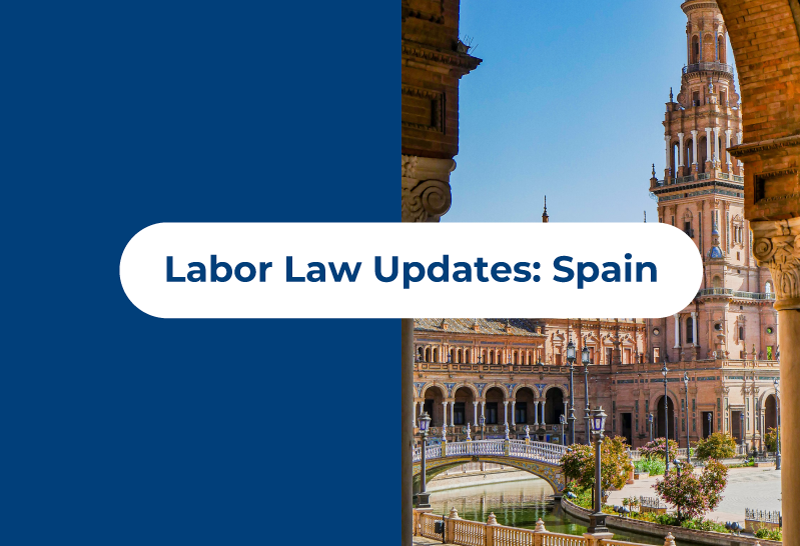Staying abreast of labor laws in Spain is key for international employers operating in the country. From changes in retirement age to advancements in parental leave policies, understanding the nuances of these updates ensures compliance and fosters a harmonious work environment.
Codified as a series of Royal Decrees in late 2023 and early 2024, Spain’s labor landscape has undergone various reforms lately. As a result, it’s the responsibility of global employers to understand the new situation moving forward.
Here, we provide a rundown of what’s new in 2024 (as well as expected changes to labor laws in Spain in 2025).

Tired of scrolling? Download a PDF version for easier offline reading and sharing with coworkers
2023-2024 Updates to Labor Laws in Spain
New 2024 SMI Agreed
After some debate, Spain’s Minimum Wage (SMI) has been agreed for 2024.
From February 2024, the new SMI or interprofessional minimum wage is €37.8 gross per day, or €1,134 gross per month distributed over 14 payments, an increase of around 5%. This applied to all workers, regardless of age, gender, or industry.
Parental Leave Extension
In addition to paid maternity leave of 16 weeks, both parents in Spain can now take up to 8 weeks of unpaid parental leave. This can be used intermittently until the child turns 8 years old and can be taken for various reasons, such as school changes or personal difficulties the child might face.
Parents with disabled children can now also take up to 26 weeks of leave.
Plans for the Promotion of LGBT+ Equality
A new law requires companies with 50 or more employees to implement a plan for the promotion of LGBT+ equality as of March 2024.
Required plans must prevent and address harassment or violence against LGBT+ individuals, as discrimination based on sexual orientation, gender identity, gender expression, and sexual characteristics is prohibited in the workplace.
Failure to ensure equal treatment for LGBT+ employees can result in legal consequences. The law categorizes violations into minor, serious, and very serious, with fines reaching up to EUR 150,000.
For now, the specifics of the plan requires are subject to collective bargaining agreements (CBAs) and agreement with worker representatives.
Predictable and Transparent Working Conditions as per EU Laws
In February 2024, Spain’s Council of Ministers approved a decree to implement a European directive on transparent and predictable working conditions.
A key element of this decree bans companies from unilaterally reducing part-time hours of work schedules. Additionally, any fraudulent part-time contracts will be automatically converted into open-ended contracts.
Social Security System for Trainees
Effective from October 2023, social security contributions for trainees in Spain have become mandatory. Employers are now obligated to pay contributions during all internships undertaken by students, whether as part of training programs or external academic internships.
Minimum pay in these circumstances now amounts to 2.54 euros for common contingencies (healthcare, retirement, etc.) and 0.31 euros for professional contingencies (unemployment, training, etc.) per day of work experience.
However, it’s good to note that the contribution for common contingencies may be subsidized up to 95%.
An Increase in the Retirement Age
Starting in 2024, ordinary retirement with a full pension will be not be available for individuals with less than 38 years of contributions until the age of 66 years and 6 months.
However, those with 38 or more years of contributions will retire at 65 years.
This is part of a push to increase the retirement age in Spain to 67 by 2027.
More General Changes to Labor Laws in Spain
Digital Efficiency Efforts
A 2023 Royal Decree, implemented in early 2024, emphasizes digitalization and procedural streamlining within public services, including the justice system, civil service, local government, and patronage.
This includes ensuring the right of individuals and companies to electronic interactions, telematic hearings, and the creation of the Justice Folder, an online platform making legal proceedings more open and available to users. This service is not yet available but will be run through the Ministry of Justice.
Labor Inspectorate and Social Security Focus Shift
In 2024, the Labor and Social Security Inspectorate (ITSS) has announced that it will focus on evaluating companies’ gender equality policies, wage equity, and diversity and inclusion measures in the coming year.
To support this initiative, a Royal Decree enacted on December 5th, 2023, effective from March 2024, aims to enhance the use of electronic media in ITSS operations, sanctioning procedures in social jurisdictions, and Social Security contribution settlements to improve assessment efficiency.
Key measures include electronic processing of procedures and the establishment of an ITSS Electronic Register of Representatives.
Potential Future Updates to Labor Laws in Spain
Severance Payments
In 2024, the European Committee of Social Rights (ECSR) has called on the Spanish government to review the compensation system for unfair dismissal, citing many complaints made by employees.
While immediate reform is unlikely, the Labour Minister expressed an interest in reviewing the procedures around severance pay in order to boost fairness.
Reduction of Maximum Legal Working Hours
The Spanish government has expressed a desire to reduce working hours to improve work-life balance and productivity. This initiative is part of a broader effort to modernize labor practices and align them with contemporary societal needs.
As a result, the government has said that it aims to progressively reduce the working week to 37.5 hours by 2025. It has also said that this must be done without a reduction in the wages earned by employees overall.
Keep Up to Date with Every Change, Let INS Global Guide Your International Labor Compliance
Knowing the changes that come from updates to labor laws in Spain is crucial for international employers aiming to maintain compliance and foster fair employment practices. INS Global can guide you through these changes, ensuring your business adheres to legal requirements and promotes a supportive work environment.
Through the local and specialized support of our EOR in Spain, we help you effectively navigate every update as it happens, keeping your operations running without delays or costly restructuring. employers not only comply with labor regulations but also enhance employment relationships, well-being, and satisfaction.
INS Global offers the expertise and resources needed to manage the complexities of global expansion, allowing you to focus on your core business operations while ensuring your workforce is treated fairly and equitably.
To learn more about our comprehensive range of tailored services including EOR (Employer of Record), PEO (Professional Employer Organization), payroll, recruitment, and compliance support in Spain, talk to our team of expert advisors today.



PARTAGEZ